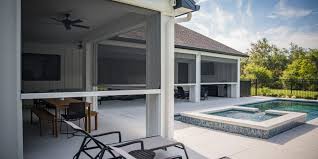
Creating peaceful environments has become a top priority for many homeowners and apartment dwellers in today’s increasingly crowded living spaces. What are the noise-reduction benefits of retractable privacy screens?
Retractable privacy screens can reduce ambient noise by 15-25%, depending on the material thickness and construction. Most standard screens, with their layered fabric or vinyl composition, provide moderate sound-dampening benefits.
While this noise reduction level might sound promising, it’s important to keep reading to understand the various factors that can impact actual performance – from installation methods to material choices – as these can significantly affect the sound-dampening results you’ll achieve in your specific situation.
How Do Different Screen Materials Affect Noise Reduction?
The material of your retractable privacy screen plays a crucial role in its noise-reduction capabilities. Heavy-duty vinyl and multi-layered fabric screens typically offer the best sound dampening, with some premium materials reaching up to 30% noise reduction. Thinner, single-layer materials like mesh or lightweight polyester provide minimal sound benefits, usually less than 10%.
Materials with dense weave patterns or multiple layers create more barriers for sound waves to penetrate, resulting in better noise reduction. Some manufacturers even incorporate special acoustic materials within their screens, though these premium options are more expensive.
What Role Does Proper Installation Play In Sound Dampening?
Installation methods can make or break your screen’s noise-reduction performance. Screens properly mounted with minimal gaps and secure tracking systems perform significantly better than loosely installed alternatives. Even small gaps allow sound to pass freely, potentially reducing effectiveness by up to 50%.
The mounting location also matters. Screens installed closer to the noise source create a more effective sound barrier. Additionally, overlapping multiple screens or combining them with other sound-reduction methods can enhance their performance.
What Are The Limitations Of Privacy Screens For Noise Control?
It is important to maintain realistic expectations about what privacy screens can achieve in terms of noise reduction. They work best for moderate ambient noise and are less effective against low-frequency sounds or sudden loud noises. They shouldn’t be considered a primary solution for serious noise problems.
For optimal noise control, privacy screens should be part of a broader sound management strategy. This might include soundproofing windows, adding outdoor vegetation, or installing acoustic panels. Understanding these limitations helps homeowners make informed decisions about their noise reduction needs.
Can Weather Conditions Affect A Screen’s Noise Reduction Performance?
Environmental factors can significantly impact how well your retractable privacy screen performs as a sound barrier. Wind, in particular, can reduce effectiveness by creating vibrations in the screen material and opening temporary gaps in the coverage. Rain can also affect performance, as wet materials may sag or move differently than when dry.
Temperature fluctuations can cause materials to expand or contract, potentially creating gaps or affecting the screen’s tension. Choose materials rated for your climate zone for optimal year-round performance and ensure your installation includes weather-resistant components.
What Maintenance Is Required To Maintain Noise Reduction Benefits?
Like any home improvement feature, retractable privacy screens require regular maintenance to maintain their noise-reduction capabilities. Loose hardware, torn materials, or misaligned tracks can all compromise sound-dampening performance. Mounting hardware should be inspected and tightened regularly every 3-6 months.
Cleaning is also crucial, as dirt and debris can weigh down the material and affect its ability to maintain proper tension. Most screens can be cleaned with mild soap and water, but check manufacturer recommendations first. Replace damaged panels promptly; tears or holes can significantly reduce noise-blocking effectiveness.
Quick repairs and regular maintenance preserve noise reduction benefits and extend the overall lifespan of your privacy screen investment. When properly maintained, most quality screens can reduce noise effectively for 5-7 years before requiring replacement.
Taking The Next Step Toward A Quieter Space
Before investing in a retractable privacy screen primarily for noise reduction, consult a professional installer who can assess your specific noise issues and space requirements. They can recommend the most effective materials and installation methods for your situation, ensuring you get the maximum sound-dampening benefits from your investment.
